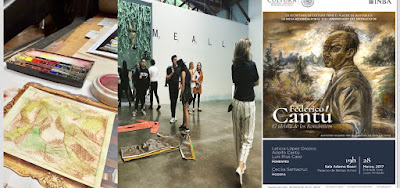He vivido casi toda mi vida lejos de mis cielos.
Pero mis pies están marcados en los códices,
en la voz profunda de mi pueblo.
Camino sobre el mar y las nubes que me traje:
son mi tierra firme.
¿Quién me la puede quitar?
Cuando digo que estoy solo es porque no estoy en la plaza pública
sino en cada uno de vosotros,
como en los granos la granada.
Podríais enterrarme en la voz de cualquier niño
si tiene los pies descalzos y ha visto los volcanes.
Mis ojos siempre se abren sobre la luz primera,
y al cerrarlos, sobre mí cae siempre la sombra de mi infancia.
¿Y todo lo que he vivido,
me pregunto, toda el agua escurrida entre mis dedos,
todo lo bailado, no es un sueño?
No he tenido tiempo para soñar, amigos.
Apenas si he tenido para no morirme.
No puedo descifrar el símbolo
porque el símbolo no es un lenguaje.
Estoy tan cerca que no me veis
en las cenizas de los muertos
y en las manos de los niños futuros.
Tercamente Mexicano,
no necesito recordar, me basta con palparme.
El sueño no tiene vocales,
pero tiene llamaradas y tambores mudos,
y las mismas fogatas
arden en las mismas cumbres.
...Si tiene los pies descalzos y ha visto los volcanes.
Pero mis pies están marcados en los códices,
en la voz profunda de mi pueblo.
Camino sobre el mar y las nubes que me traje:
son mi tierra firme.
¿Quién me la puede quitar?
Cuando digo que estoy solo es porque no estoy en la plaza pública
sino en cada uno de vosotros,
como en los granos la granada.
Podríais enterrarme en la voz de cualquier niño
si tiene los pies descalzos y ha visto los volcanes.
Mis ojos siempre se abren sobre la luz primera,
y al cerrarlos, sobre mí cae siempre la sombra de mi infancia.
¿Y todo lo que he vivido,
me pregunto, toda el agua escurrida entre mis dedos,
todo lo bailado, no es un sueño?
No he tenido tiempo para soñar, amigos.
Apenas si he tenido para no morirme.
No puedo descifrar el símbolo
porque el símbolo no es un lenguaje.
Estoy tan cerca que no me veis
en las cenizas de los muertos
y en las manos de los niños futuros.
Tercamente Mexicano,
no necesito recordar, me basta con palparme.
El sueño no tiene vocales,
pero tiene llamaradas y tambores mudos,
y las mismas fogatas
arden en las mismas cumbres.
...Si tiene los pies descalzos y ha visto los volcanes.






